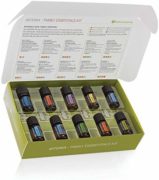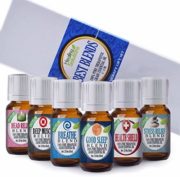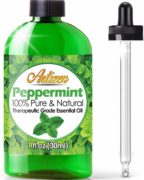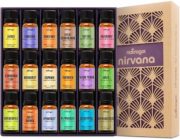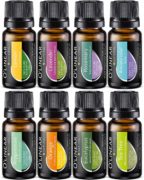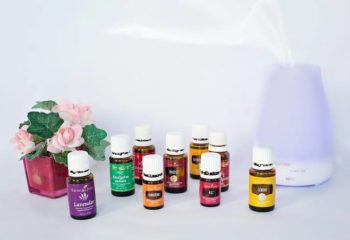While essential oils are great and can bring many benefits into the home and those who use them, many...
List of the Best Essential Oils
1. doTERRA Family Essential Kit
Pros
- Can help to make many home remedies
- Provides your home with different scents for your diffuser
- Certified pure therapeutic grade essential oils
Cons
- May not be packed well, leading to loss of oils during transit
- Some scents may not smell the way they should
Bottom Line
Even with its issues, the doTERRA Family Essentials Kit is still one of the best essential oil kits out in the market, as it serves many purposes. Aside from being used on a diffuser to give your home a beautiful, crisp scent, it also works to provide your family a therapeutic treatment for various ailments since these are CPTG Certified Pure Therapeutic Grade essential oils.
In the end, the doTERRA Family Essentials Kit is worth the price tag that it comes with. It gives our home a more relaxed and comfortable vibe while serving many purposes and giving customers multiple scents to choose from. So take the opportunity to buy them now while they are on sale because once they're gone, you will miss out on all the benefits they can provide.
Read our in-depth doTERRA Family Essential Kit Review here.
2. Healing Solutions Best Blends Essential Oil Set
Pros
- Comes in various scents — perfect for all your mixing needs
- Includes therapeutic essential oils
- FDA registered to ensure quality and control
Cons
- Smell and blend may have changed from its original quality
- Some scents may have a pungent odor
Bottom Line
In the end, the Healing Solutions Best Blends Essential Oil Set is an excellent addition to any scent collector's list. They not only have more scents to offer, but they also make their products more affordable and available to the public. With a broader range of scents to choose from, you can collect them for your diffusers for home use, or you can mix and pair the oils to make your own blend of rich and fresh-smelling scents.
Even with its apparent quality issues, the Healing Solutions Best Blends Essential Oil Set is still one of the top essential oil sets out in the market now. Their selection is unbeatable, and their price is the most affordable across the industry, so any mistakes on their part can be forgiven. If you're looking to expand your scent range or wanting to start your own scent mixing business, then you've come to the right place.
Read our in-depth Healing Solutions Best Blends Essential Oil Set Review here.
3. Artizen Peppermint Essential Oil
Pros
- The highest-quality and most potent peppermint oil
- Uses high-quality glass bottles
- Uses pure oil, unlike the diluted competitors
Cons
- May pose hazards if purchased for personal use — may burn the skin
- The bottle may leak all over the package making everything smell like it
Bottom Line
Compared to its competitors, the Artizen Peppermint Essential Oil is a product that not only delivers high-quality and natural peppermint oil, but also gives customers the confidence to buy from this brand. While some customers have experienced unpleasant problems with this product, the company's dedication to customer satisfaction is enough for consumers to keep coming back for more.
In the end, the Artizen Peppermint Essential Oil is an excellent product to add to your collection for home use and for other applications that you need. Its concentration and potent blend make it ideal for relaxation, aromatherapy, and for mixing and blending. As long as you take care not to use it on yourself, you will be able to enjoy all the benefits this peppermint oil has to offer.
Read our in-depth Artizen Peppermint Essential Oil Review here.
4. Natrogix Nirvana Essential Oils
Pros
- Comes in a box of nine bottles of different scents
- Certified, therapeutic essential oil set
- Offers 18 scents in total for you to choose from
Cons
- Has a weak smell or may be diluted
- Scents may smell like licorice and can be nauseating
Bottom Line
The Natrogix Nirvana Essential Oils collection can give us a great selection of the best scents available in the market now, but the company's neglect towards giving customers high-quality products takes away from the whole experience. Nevertheless, their offer to deliver 18 different scents is more than what most companies can provide. Only time can tell if they'll listen to customer feedback and improve on their blends to provide us with quality over quantity.
Overall, with their much lower prices and an excellent collection of scents (assuming you got a good batch), the Natrogix Nirvana Essential Oils is capable of giving some value for money. But because of its lackluster performance to deliver beautiful smelling scents, it won't be getting the first place as the best essential oil set anytime soon. Then again, what can we expect of a $40, 18-piece essential oil set?
Read our in-depth Natrogix Nirvana Essential Oils Review here.
5. O’linear Essential Oil Aromatherapy Set
Pros
- Comes in a set of 8 Natural Essential Oils
- Compact 10ml bottles are easy to transport or to gift as individual bottles
- Not just for their scents, they also provide relief from ailments and injuries
Cons
- May be delivered without proper checking from manufacturer
- The smell may be too overwhelming and may induce headaches
Bottom Line
The O'linear Essential Oil Aromatherapy Set would have been a perfect product if it wasn’t for a few details that the company has overlooked, especially when it comes to delivery and quality. However, no company is perfect, and it’s safe to say that O’linear may be one of them, thanks to this near-flawless essential oils set that helps our homes in more ways than one.
In the end, the O'linear Essential Oil Aromatherapy Set is an excellent product to consider bringing into your daily routine as it not only helps to combat odors at home, but it also gives health benefits inside and outside the body. It also helps to improve our well being physically and emotionally while making an excellent gift for anyone who would love to have an essential oil set that has all the best scents that not only smell good but also lingers in your home.
Read our in-depth O’linear Essential Oil Aromatherapy Set Review here.
